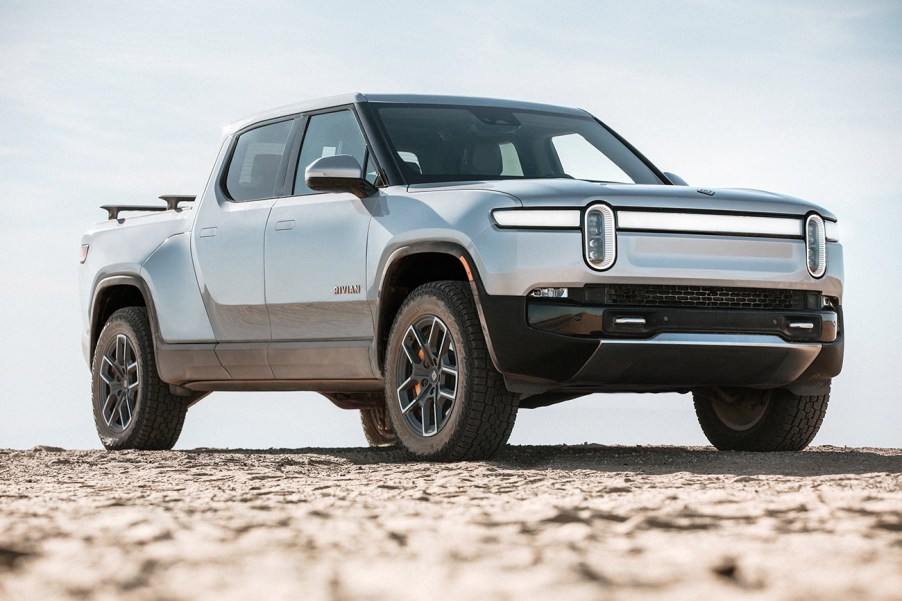
Democrats Change EV Tax Credits For High Priced Trucks
The newly proposed EV tax credits have quickly become one of the most hotly debated subjects in the automotive industry. President Joe Biden and over 100 Democrat representatives have proposed tax incentives up to $12,500 for EVs built in the United States by union workers. Foreign automakers and governments oppose the legislation because they think it is discriminatory and want lawmakers to change the bill. It looks like that has happened but not in the way opponents want.
Democrats change EV tax credits plan to include high-MSRP trucks and SUVs

When first proposed, the new EV tax credits plan would offer up to $12,500 for EVs built in the United States by union labor. Any EV built by nonunion labor would not qualify for the additional tax incentive. Another requirement focuses on the MSRP of the vehicles. Electric trucks could not have an MSRP higher than $74,000, SUVs were capped at $69,000, and electric vans were capped at $64,000.
However, according to a report from Reuters, Democrats have changed the EV tax credits plan and raised the cap to $80,000 for vans, SUVs, and trucks. Sedans are still capped at $55,000.
With the new MSRP caps, higher trim levels of electric trucks such as the Ford F-150 Lightning can be had while still eligible for the new tax incentives. Assuming that it uses union labor, Rivian’s R1T and upcoming R1S could qualify as well.
To balance out the MSRP threshold, Democrats also changed the income requirement for individuals seeking to benefit from the new EV tax credits. Previously, individual taxpayers could not have an adjusted gross income over $400,000, while joint filers were limited to $800,000.
With the new changes, individual income eligibility is lowered to $250,000, and joint filers are limited to $500,000 yearly income. In a nutshell, now people who make less can still get a tax incentive on vehicles that cost more.
Toyota is publicly criticizing the tax credits
Toyota is just one of several foreign automakers against the EV tax credits. Even though Toyota builds vehicles in the United States, its EVs would not qualify for the additional tax incentive since the Japanese brand does not use union labor in its U.S. facilities.
In a recent interview with CNBC, Toyota North America Executive Vice President Bob Carter said that the EV tax credit plan is “bad public policy.” Beyond the comments from the EVP, Toyota also took out ads in major newspapers such as The Wall Street Journal and The New York Times aimed at Congress, asking it to “put politics aside.”
Toyota would rather try and pressure lawmakers to change the language of the EV tax credits legislation than unionize its workers. The automaker is not alone in this stance. BMW, Hyundai, Honda, Nissan, and others have taken similar views against the proposed legislation.
Canada and other international governments may challenge the legislation in court

Pressure from foreign automakers is one thing, but there is a genuine possibility that international governments may take the Biden administration to court over the EV tax credits.
Canadian representatives have publicly stated that they are against the legislation since the tax credits only apply to vehicles built in the United States. Canadian lawmakers said that the bill might violate the United States-Mexico-Canada (USMCA) trade agreement and threatened a formal challenge.
International governments such as the European Union, Germany, Japan, Mexico, France, South Korea, Italy, and more have also expressed their opposition to the new EV tax credits and have sent a letter to the Biden administration to express their concern.
Those governments said that the tax credit plan is “inconsistent with the U.S. commitments made under WTO [World Trade Organization] multilateral agreements.”
So far, it looks like President Joe Biden and the Democrat representatives behind this proposal have no plans to alter the legislation to include Foreign-built vehicles or nonunion-built vehicles.


